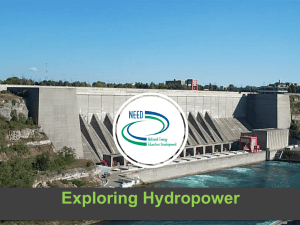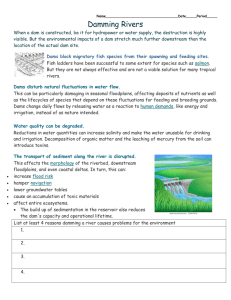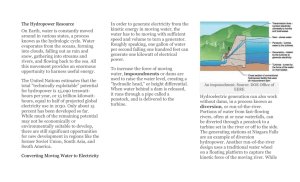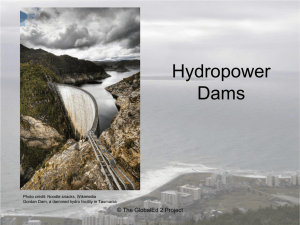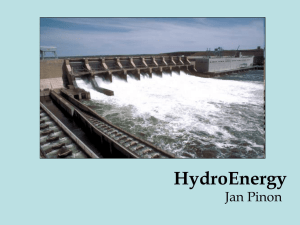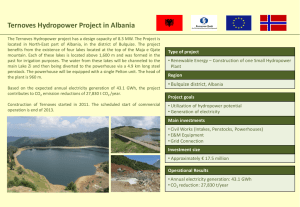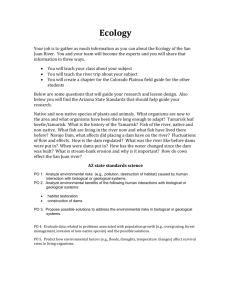Click here - Upper Missouri Waterkeeper
advertisement
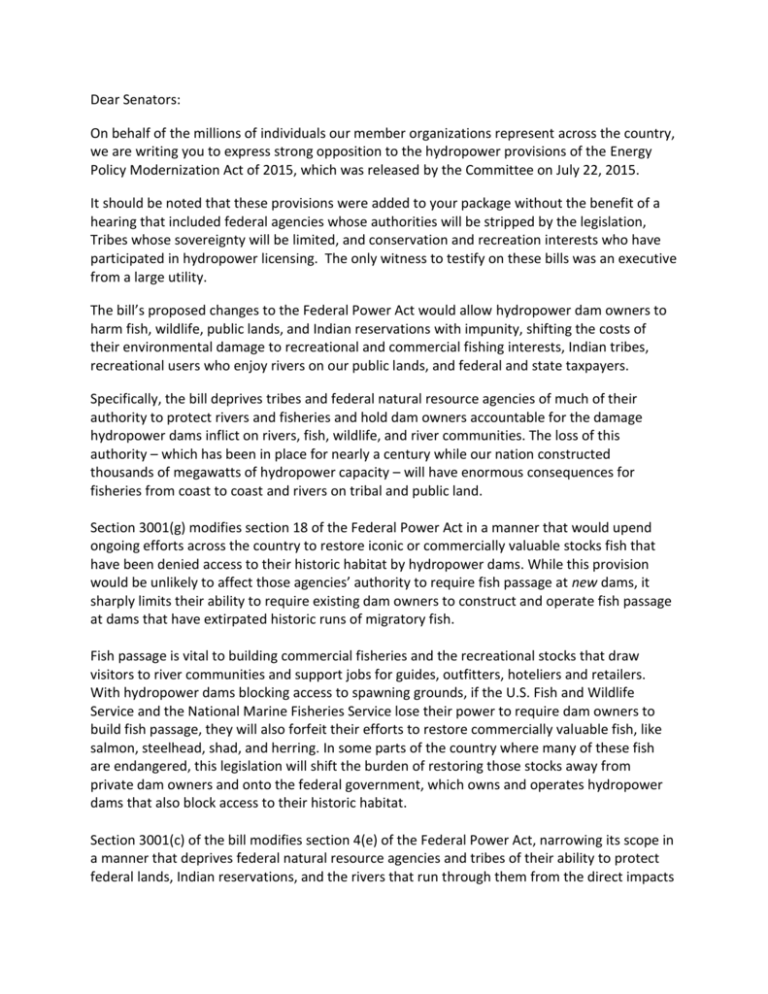
Dear Senators: On behalf of the millions of individuals our member organizations represent across the country, we are writing you to express strong opposition to the hydropower provisions of the Energy Policy Modernization Act of 2015, which was released by the Committee on July 22, 2015. It should be noted that these provisions were added to your package without the benefit of a hearing that included federal agencies whose authorities will be stripped by the legislation, Tribes whose sovereignty will be limited, and conservation and recreation interests who have participated in hydropower licensing. The only witness to testify on these bills was an executive from a large utility. The bill’s proposed changes to the Federal Power Act would allow hydropower dam owners to harm fish, wildlife, public lands, and Indian reservations with impunity, shifting the costs of their environmental damage to recreational and commercial fishing interests, Indian tribes, recreational users who enjoy rivers on our public lands, and federal and state taxpayers. Specifically, the bill deprives tribes and federal natural resource agencies of much of their authority to protect rivers and fisheries and hold dam owners accountable for the damage hydropower dams inflict on rivers, fish, wildlife, and river communities. The loss of this authority – which has been in place for nearly a century while our nation constructed thousands of megawatts of hydropower capacity – will have enormous consequences for fisheries from coast to coast and rivers on tribal and public land. Section 3001(g) modifies section 18 of the Federal Power Act in a manner that would upend ongoing efforts across the country to restore iconic or commercially valuable stocks fish that have been denied access to their historic habitat by hydropower dams. While this provision would be unlikely to affect those agencies’ authority to require fish passage at new dams, it sharply limits their ability to require existing dam owners to construct and operate fish passage at dams that have extirpated historic runs of migratory fish. Fish passage is vital to building commercial fisheries and the recreational stocks that draw visitors to river communities and support jobs for guides, outfitters, hoteliers and retailers. With hydropower dams blocking access to spawning grounds, if the U.S. Fish and Wildlife Service and the National Marine Fisheries Service lose their power to require dam owners to build fish passage, they will also forfeit their efforts to restore commercially valuable fish, like salmon, steelhead, shad, and herring. In some parts of the country where many of these fish are endangered, this legislation will shift the burden of restoring those stocks away from private dam owners and onto the federal government, which owns and operates hydropower dams that also block access to their historic habitat. Section 3001(c) of the bill modifies section 4(e) of the Federal Power Act, narrowing its scope in a manner that deprives federal natural resource agencies and tribes of their ability to protect federal lands, Indian reservations, and the rivers that run through them from the direct impacts of hydropower dams. The bill limits their authority to lands that are occupied by project works, which would exclude many lands and waters that are directly affected by hydropower projects. Section 3001(c) overturns the landmark case Tacoma v. FERC, which cemented into place protections for Native American Tribes, fish, wildlife, recreation and public lands. This change would strip natural resource agencies of their authority to protect the rivers that run through national parks, forests, and wildlife refuges. Under this proposal, the U.S. Fish and Wildlife Service will be unable to protect fish and wildlife in wildlife refuges affected by hydropower dams. Land management agencies like the Forest Service and the Bureau of Land Management would not be able to require dam owners to leave water in many rivers affected by hydropower dams in order to protect fishing, boating, wildlife, and other recreation on public lands. The costs of damage to public lands would be paid by anglers, boaters and other recreational users. If this provision were to become law, Tribes would also no longer be able to protect their rivers, land, and communities from the impacts of hydropower dams that dewater streams or harm fisheries on which they depend for sustenance and commerce. This change is a direct assault on tribal sovereignty, and leaves tribes powerless to advocate for their rivers in court and at the dam license negotiating table. Hydropower licenses are issued for up to 50 years. Hydropower facilities that are coming up for relicensing now were first constructed before virtually all modern environmental laws were in place. It is during relicensing proceedings that the public gets the opportunity to ensure that dam owners make the necessary changes to get their facilities up to modern standards. The opportunity to mitigate for the damage to the environment, while still providing reliable electricity, only arises once in a generation or two. When a hydropower dam harms fish, wildlife, and public lands, we are forced to live with that mistake for more than four decades. The balance between power and non-power values provided by the Federal Power Act has existed for almost a century. This balance protects the public’s right to enjoy their rivers, a right which can and should be compatible with responsible electricity production. However, the Energy Policy Modernization Act upends that balance. Simply put, Sections 3001(c) and 3001(g) give large utilities an advantage in hydropower relicensing at the expense of fisheries, public lands, recreation, and tribal interests. We urge the Committee to reject these provisions and with them the narrow interests of large energy corporations that seek to maximize their profits and minimize their responsibilities to the public. Sincerely,
